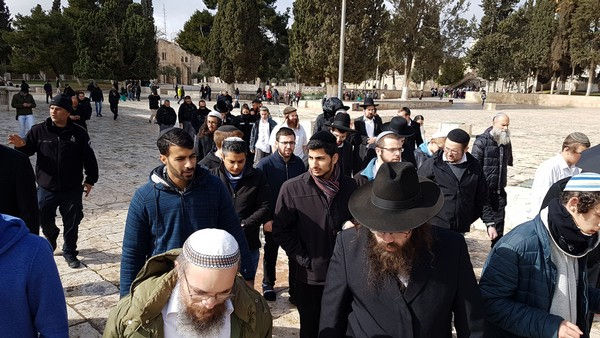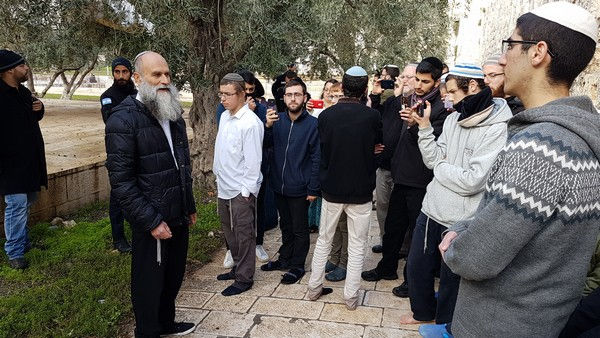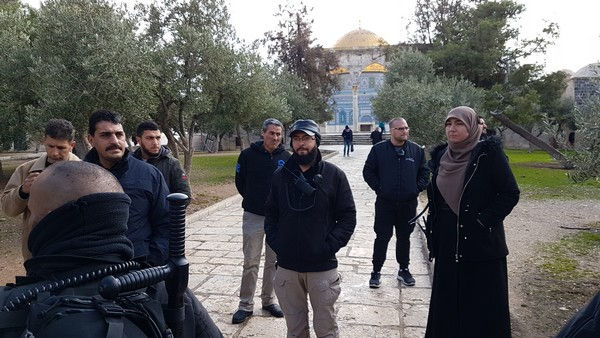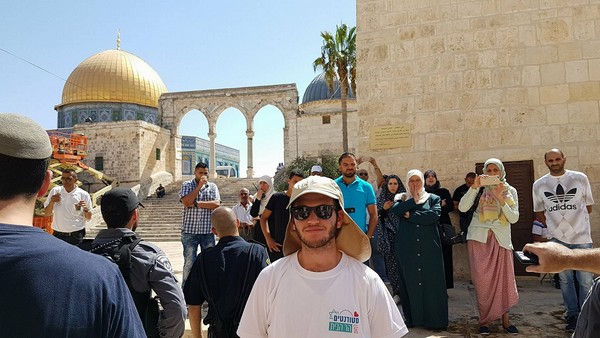Our Historic Jewish Battle Cries on the Temple Mount
- Michael Miller
- Jan 29, 2018
- 7 min read
Updated: Dec 14, 2020

The group of 42 Jews who prayed on the Temple Mount (Image credit: Michael Miller)
In mid-January, I signed up to bring Jews up to the Temple Mount as a guide to teach them about the holiest site in Judaism. What I expected to be a run-of-the-mill educational experience turned out to be one of the most amazing experiences I’ve ever had on the Mount.
At the security checkpoint leading to the site, I met students from three different yeshivot (Jewish study institutions) - Yeshivat HaRa’ayon HaYehudi headed by Rabbi Yehuda Kroizer Shlit”a, Yeshivat HaMikdash headed by Rabbi Yisrael Ariel Shlit”a, and Yeshivat Har HaBayit headed by Rabbi Eliyahu Weber. Walking up the Mughrabi Bridge ramp to the Temple Mount area itself, we sang songs about building the Temple.
Rabbi Ariel started off our visit with holy words of Torah, motivation, and inspiration on the south-western part of the Temple Mount. We made our way along the southern part of the Mount to the eastern part, stopping for several moments in front of the location where the entrance to the Beit HaMikdash (Temple) stood, and the rabbi spoke again.
Precisely during this uplifting moment, the Jordanian Waqf members screamed at us, sensing that Jews were praying in whispers. In response, we decided to yell back at them and shut them up because we couldn’t hear the rabbi speaking. They were paying extra careful attention to our large group of 42 Jews, and members of our group were “hiding” amongst each other in order to get words of prayer out into the open.
Watch dramatic moments from the visit in the video below, as the group of Jews respond to the Muslim chants by saying the Shema and singing:
(Video credit: Michael Miller)
The police told us to continue on our path and ignore the Waqf, and we advanced to the south-eastern corner before the Gate of Mercy (Sha’ar HaRachamim), where we stopped as Rabbi Kroizer shared some inspirational words of Torah regarding the Beit HaMikdash and its sacrifices. He noted the most of these sacrifices was the Korban Pesach that we have an obligation to do today, just like brit milah (circumcision).
Waqf Degradation

Turning to the north, Rabbi Ariel stood for a brief moment opposite Sha’ar HaShvatim (the Tribes Gate) – the gate his paratrooper unit broke through in the legendary 1967 Six Day War in order to conquer the Temple Mount. He shared his exhilarating personal experience of liberating the Mount from Jordanian hands, telling us how he was assigned to guard the Temple Mount with his Mag machine gun and heavy ammunition while the other soldiers continued onward towards other sections of Jerusalem. His story was truly awe-inspiring and moving to hear.
As we walked north we noticed additional security forces arrive to join our group as well as more Waqf personnel - the Waqf guards following us didn’t like that we were praying and causing “trouble,” and so they called for backup.
We continued until we were perpendicularly opposite the Holy of Holies (Kodesh HaKodeshim), where Rabbi Ariel shared more divrei Torah.
But this time the Jordanian Waqf members raised the volume of their walkie-talkie radios higher so that it would be difficult to hear what the rabbi was saying. At the end of the rabbi’s words they started shouting their famous slogans “Allahu Akbar” (Allah is greatest) and “With blood and spirit we will conquer and cleanse Al-Aqsa Mosque.”
While they shouted at us the Israeli police did absolutely nothing, and so a couple of brave Jews in the group decided to put an end to the degradation. They decided to shout back, with bravery and courage, “Shema Yisrael” (Hear O Israel) and “Hashem Hu HaElokim” (Hashem is G-d), sanctifying the divine name.
Conquering the Temple Mount
This was quickly followed by all 42 of us shouting at the top of our lungs the Jewish battle cries, songs of rebuilding the Temple, songs of Tehillim, and songs of Rosh Chodesh (the new Jewish month). The Israeli policemen were bewildered as they had no idea what to do with all of these crazy, proud Jews. They expected us to play dead, to “suck up” the humiliation like most Jewish groups do, and take the verbal abuse, degradation, and humiliation willingly.
While we were singing not only was my adrenaline surging, but I felt myself tapping into and unlocking a special type of energy in my Jewish soul (neshama) - an energy of Jewish pride that can only be accessed on the Temple Mount and not in Uman, Brooklyn, Los Angeles, or Lakewood. For a long time I have not felt Jewish pride in my own country like this: Jews singing to G-d at the top of their lungs at the holiest site in Judaism, a place that is still not in our hands and is under foreign sovereignty.

Rabbi Yehuda Kroizer (Image credit; Michael Miller)
I looked up at the heavens, sang my lungs out, and smiled a huge smile. This group of Jews finally dared to do what was considered unimaginable, unthinkable, and unrealistic. The mere feeling was simply indescribable; I even cried tears of joy. For a good several minutes, it felt like victory, like we had won and actually conquered the Mount. We made history!
While we sang on the northern side of the Mount I glanced at my watch - it was 1:30 PM, the end of visiting time for non-Muslims during the winter hours when police rush to hurry Jews out exactly on time. But we ended up spending an extra 10 minutes on the site, in a huge victory over the oppressive norms. I felt ecstatic, surging with pride and thinking to myself: We did it, we finally did it!
Pushed Back to Galut
As we continued in song along the north-western side of the Mount, the Jordanian Waqf personnel and Arab visitors started getting restless with the police and showing signs of violence, saying, “Look at what these filthy Zionist Jews are doing, stop them, they should all die; leave our holy site at once, you don’t belong here you filthy pigs.” We didn’t pay any attention to their curses and slogans; rather we continued shouting verses from the Bible (Tanach) and Tehillim, completely ignoring their existence.
The ping-pong of confrontations between us and the Waqf and Arabs eventually got physical as they attempted to harm several of the Jews in our group, prompting the Israeli police to try and get in between us to “restore order.” Some Waqf personnel actually succeeded in physically assaulting a few Jews and, as a result, the Israeli police pushed the Jewish visitors out of the way back into our group, and out of the Iron Gate (Sha’ar HaBarzel) off the Mount, all while not lifting a finger to stop the violent Waqf members and Arabs from verbally and physically harassing us.
The way the “visit” usually goes, Jews leave from the Chain Gate (Sha’ar HaShalshelet), but this time given that we were being “provocative” and “disobedient” Jews, the Israeli police forced us to exit the Mount through the Iron Gate, two gates before the Chain Gate. As we approached the gate, the Arabs screamed at us and the Israeli police forcefully pushed us out.
A few policemen pushed me towards the exit, and boy did they push! Now I know how it feels to be pushed by our “own” forces - suffice to say, it’s not pleasant. They “pushed” me back into the Exile (Galut) mentality we sadly and pathetically live in, and following my tears of joy, I shifted modes and began crying tears of degradation, Galut, and sadness.

Police and Waqf (Image credit: Michael Miller)
After the police pushed us out of the gate and hastily closed it on us, the security forces pushed us even further away from the gate while Arabs screamed at us from the rooftops “Allahu Akbar” and “Jews, get out of here, this isn’t your place.” Some even attempted to throw water on us from above.
At a certain point, the security forces shifted from pushing us away from the Mount to chasing us. The Jewish group split in two different directions while running into the Muslim Quarter of the Old City, but the Israeli police were there to catch us at the end, and the police “escorted” all 42 of us - like a flock of sheep - to the local police station, by-passing the entrance to the Kotel (Western Wall) where the security guards at the site blocked our path.
A Time for Self-Sacrifice
As they shoved us into the police station, the officers quickly demanded everyone’s ID cards in order to file detainment reports. As we were “settling” in to the station, we asked both Rabbi Ariel and Rabbi Kroizer what to do, to which they replied: “Let’s daven (pray) Mincha first, then we’ll see what happens.” I asked Rabbi Ariel what to do regarding my ID, to which he replied, “If they didn’t ask specifically for your ID, don’t give it to them.” We prayed Mincha and half of us gave in to the Israeli police because they said, you can’t leave here unless you have a “talk” with us.
Personally I wanted to get out of the station as soon as possible, because I was so unused to being in this “unique situation.” As they say, there’s a first time for everything. I gave them my ID, got a reprimand not to do it again, and signed a document saying that I was detained and was not physically injured by the police - the last thing the Israeli police want is for me to file a lawsuit against them in court, because they know they’ll lose.

Michael Miller on the Temple Mount (Image credit: Michael Miller)
Our visit caused quite a stir, making headlines and putting the Temple Mount on page one of the news. Just as Rabbi Meir Kahane HY”D took “radical” steps to raise awareness about Soviet Jewry, holding violent protests and putting the issue on the front page of every newspaper in the US, here too it seems raising awareness is the key. Though we were successful in our challenge to the “status quo,” sadly we are still living in an Exile inside Eretz Yisrael (the Land of Israel). This must change. When? That’s up to us.
Looking back on the experience, I now know what mesirut nefesh (self-sacrifice) truly means and what it feels like. I got a taste of it from this event. G-d demands of us more mesirut nefesh; we need much more of the right kind of self-sacrifice by the Jewish people in the right moments, with a little good old fashioned chutzpah (audacity) when the situation demands it. If we do not, we will face dire consequences in the future, and in the end we will regret not doing enough for G-d and his chosen people in Israel.
































Comments